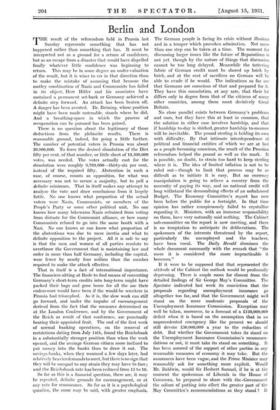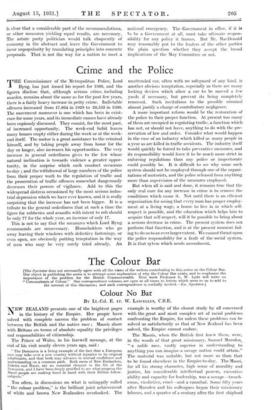Berlin and London
THE result of the referendum held in Prussia last Sunday represents something that has not happened rather than something that has. It must be interpreted not as a ground for a return of confidence, but as an escape from a disaster that would have dispelled finally whatever little confidence was beginning to return. This may be in some degree an under-valuation of the result, but it is wiser to err in that direction than to make the mistake of assuming that because the motley combination of Nazis and Communists has failed in its object, Herr Hitler and his associates have sustained a permanent set-back or Germany achieved a definite step forward. An attack has been beaten off. A danger has been averted. Dr. Bruning, whose position might have been made untenable, stands where he did. And a breathing-space in which the process of recuperation can be pursued has been gained.
There is no question about the legitimacy of those deductions from the plebiscite results. There is reasonable ground, indeed, for going a little further. The number of potential voters in Prussia was about 26,900,000. To force the desired dissolution of the Diet fifty per cent, of that number, or little short of 13,500,000 votes, was needed. The votes actually cast for the dissolution were roughly 9,763,600—thirty-six per cent. instead of the required fifty. Abstention in such a rase, of course, counts as opposition, for what was necessary was not to secure a majority, but to poll a definite minimum. That in itself makes any attempt to analyze the vote and draw conclusions from it largely futile. No one knows what proportion of the actual voters were Nazis, Communists, or members of the People's Party or some other political unit. No one knows how many lukewarm Nazis refrained from voting from distaste for the Communist alliance, or how many Communists refused to go into the same booth with a Nazi. No one knows or can know what proportion of the abstentions was due to mere inertia and what to definite opposition to the project. All it is safe to say is that the men and women of all parties resolute to overthrow the Government that is maintaining law and order in more than half Germany, including the capital, were fewer by nearly four million than the number required to make the attack effective.
That in itself is a fact of international importance. The financiers sitting at Basle to find means of converting Germany's short-term credits into long-term might have packed their bags and gone home for all the use their endeavours would have been if the would-be wreckers in Prussia had triumphed. As it is, the slow work can still go forward, and under the impulse of encouragement derived from the fact that the measures determined on at the London Conference, and by the Government of the Reich as result of that conference, are punctually bearing their appointed fruit. The end of the first week of normal banking operations, on the removal of restrictions dating from July 14th, found the Reichsbank in a substantially stronger position than when the week opened, and the average German citizen more inclined to put money into the banks than to draw it out. The savings-banks, when they resumed a few days later, had relatively heavier demands to meet, but there is no sign that they will be unequal to any strain they may have to face; and the Rcichsbank rate has been reduced from 15 to 10.
So far as this is a financial question, there are, it may be repeated, definite grounds for encouragement, or at any rate for reassurance. So far as it is a psychological question, the same may be said, with greater emphasis. The German people is facing its crisis without illusions and in a temper which provokes admiration. Not more than one step can be taken at a time. The moment for discussing larger issues like the future of Reparations is not yet, though by the nature of things that discussion cannot be too long delayed. Meanwhile the tottering fabric of German credit must be shored up brick by brick, and at the cost of sacrifices no German will be able to evade if he would. The indications so far are that Germans are conscious of that and prepared for it. They have this consolation, at any rate, that their lot differs only in degree from that of the citizens of many other countries, among them most decisively Great Britain.
No close parallel exists between Germany's problems and ours, but they have this at least in common, that the solution in either case involves hardship, and that if hardship to-day is shirked, greater hardship to-morrow will be inevitable. The pound sterling is holding its own with difficulty. By that intimate interdependence of political and financial entities of which we are at last as a people becoming conscious, the result of the Prussian referendum helped the pound as well as the mark. It is possible, no doubt, to strain too hard to keep sterling where it is. The idea of limited inflation is not to be ruled out—though to limit that process may be as difficult as to initiate it is easy. But no currency manipulation is going to relieve a country from the necessity of paying its way, and no national credit will long withstand the demoralizing effects of an unbalanced Budget. The Economy Committee's report has now been before the public for a fortnight. In that time opinion has rather conspicuously failed to crystallize regarding it. Ministers, with an immense responsibility on them, have very naturally said nothing. The Cabinet sub-committee on the report is now meeting, and there is no temptation to anticipate its deliberations. The spokesmen of the interests threatened by the report, particularly the unemployed and the teachers, have been vocal. The Daily Herald dismisses the whole document summarily with the remark that "the more it is considered the more impracticable it becomes."
If it were to be supposed that that represented the attitude of the Cabinet the outlook would be profoundly depressing. There is ample room for dissent from the detailed findings of Sir George May's Committee. The Spectator indicated last week its conviction that the proposals regarding unemployment insurance go altogether too far, and that the Government might well stand on the more moderate proposals of the Unemployment Insurance Commission. Exception may well be taken, moreover, to a forecast of a £120,000,000 deficit when it is based on the assumption that in an unprecedented emergency like the present we should still devote E50,000,000 a year to the reduction of debt. But whether the Government takes its stand on the Unemployment Insurance Commission's recommen- dations or not, it must take its stand on something. It has been assured of the support of other parties in any reasonable measures of economy it may take. But the assurances have been vague, and the Prime Minister may reasonably ask for something more explicit. Would Mr. Baldwin, would Sir Herbert Samuel, if he is at the moment the spokesman of Liberals in the House of Commons, be prepared to share with the •Government the odium of putting into effect the greater part of the May Committee's recommendations as they stand ? It is clear that a considerable part of the recommendations, or other measures yielding equal results, are necessary. The astute party politician would talk eloquently of economy in the abstract and leave the Government to incur unpopularity by translating principles into concrete proposals. That is not the way for a nation to meet a national emergency. The Government in office, if it is to be a Government at all, must take ultimate respon- sibility for any policy it frames. But Mr. MacDonald may reasonably put to the leaders of the other parties the plain question whether they accept the broad implications of the May Committee or not.































 Previous page
Previous page